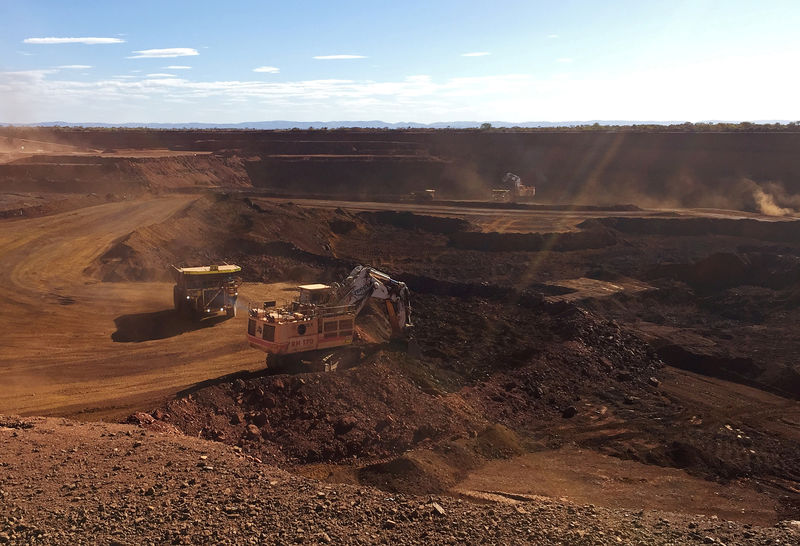By Swati Pandey and Wayne Cole
SYDNEY (Reuters) - Australia extended its record run of trade surpluses in May as stellar prices for the country's top export earner, iron ore, showered the government with more cash to revive a slowing economy even as it pursues fiscal discipline.
Australia's central bank has sliced its benchmark cash rate to an all-time low 1% and has repeatedly urged the center-right government of Prime Minister Scott Morrison to boost spending to prop up economic growth.
The government will have more cash to burn thanks to strong demand and prices for Australian goods, mainly iron ore and coal, which has allowed Morrison to forecast the nation's first budget surplus in more than a decade.
Helpfully, data out on Wednesday showed Australia's trade surplus swelled to A$5.75 billion ($4 billion) in May as exports far outpaced imports.
"Higher commodity prices are boosting mining profits and in turn tax revenues, thereby providing the Federal government with additional flexibility on fiscal policy," Westpac economist Andrew Hanlan said in a note.
Still, analysts say Morrison is unlikely to ditch his promise of surplus even though growth in the country's A$1.9 trillion economy has slowed to the weakest since the global financial crisis.
Reserve Bank of Australia (RBA) Governor Philip Lowe has highlighted the importance of infrastructure spending in boosting employment growth and economy-wide demand, emphasizing monetary policy alone cannot do all the heavy lifting.
In a speech on Tuesday, hours after cutting rates for a second time in as many months, he noted the 10-year borrowing rate for the government was the lowest since 1901, at 1.3%.
FLOUNDERING ECONOMY
While exports have surged, the rest of the economy is not playing ball.
Separate data on Wednesday showed approvals to build new homes in Australia remained subdued in May after the end of a housing-led construction boom last year. On an annual basis, approvals are down about 20%, reflecting tepid home prices.
A long downturn in the property market and anemic household consumption are the biggest reasons the RBA has embarked on an easing cycle.
Australia's Finance Minister Mathias Cormann dodged the issue of fiscal support on Wednesday, saying he was working to get promised tax cuts across both houses of parliament, which would boost incomes for millions of households.
The opposition Labor Party was scathing in its criticism about the government's inaction.
"We need a Government which is actually prepared to do something about it," Shadow Treasurer Jim Chalmers told reporters in Canberra.
"Yesterday's rate cut bolsters Labor's argument that we need to get more money into the hands of more workers sooner and circulating through this floundering economy."
BEAST OF BURDEN
Prices of iron ore, a key ingredient in steel-making, have been on a tear as strong demand from Chinese mills meets supply constraints in both Australia and Brazil. Spot iron ore prices have surged 70% so far this year to reach $123.50 a tonne and back to heights last seen in 2014.
The impact on Australia is hugely amplified because the local dollar is down at $0.7000 compared with more than $0.9000 back then. As a result, the amount a miner receives in Australian dollars for a tonne of ore has doubled over the past year to around A$176, not far from all-time highs.
But economy-wide prices are lukewarm with inflation consistently undershooting the RBA's 2%-3% medium-term target.
Many economists believe Governor Lowe will have to cut the cash rate again later this year to 0.75%, given the government's obsession to bring the budget back to black.

"Our stated view is that large new fiscal support or structural policy change is unlikely to be delivered in a timely manner to stop the RBA being the economy's beast of burden," Citi economist Josh Williamson said.